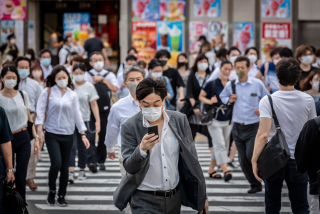In Japan, They Dial U.S. for an Undertaking in Shrewdness
- Share via
TOKYO — Foreigners fond of whining about the outrageously high prices here these days had better be particularly careful about how long they complain when they call home.
Even with a recent dash of deregulation, Japan’s international telephone rates remain among the most expensive in the world. A brief chat using Kokusai Denshin Denwa--Japan’s top global carrier--can often top $2 a minute. Not surprisingly, KDD is one of the most profitable companies in Japan’s troubled economy.
But gaiatsu --foreign pressure--is finally bringing some unexpected competition to Japan’s $3-billion annual market in transoceanic telephone calls. This isn’t a happy result of the sort of U.S.-Japan telecommunications trade liberalization talks that recently collapsed. Rather, it’s a byproduct of the kind of market-driven Yankee ingenuity that drives Japanese technocrats absolutely crazy.
By combining technology with chutzpah, American entrepreneurs have figured out how to arbitrage the arbitrarily high rates most nations set for their international telephone calls. These “callback services” exploit legal and technical loopholes in the global network in ways Japan’s telecommunications establishment couldn’t have imagined even three years ago.
They do it by literally exporting cheap American dial tones across the Pacific directly into Japanese telephones. In fact, these callback services will probably have a bigger impact on Japanese telecommunications than any deals cut by the U.S. trade representative.
“A mid-sized company with a monthly international phone bill of $5,000 to Europe and North America would now save about 40%,” says Toshi Kawakami, president of USF Pacific, one of Japan’s callback pioneers, which began offering its service just a year ago. “With the recession, there is the necessity for companies to cut their expenses rather than number of people. Many corporations with red figures must take drastic measures. Business is brisk.”
These U.S.-based callback services--which also do lots of business in Europe and Latin America--operate by leasing large volumes of excess international telephone line capacity from carriers such as MCI and Sprint. They then package and resell the capacity to individuals in countries around the world through a network of sales representatives.
Thanks to America’s deregulated and highly competitive telecommunications market, rates for international calls originating in the United States are exceptionally low. In fact, America makes the cheapest phone calls in the world. The trick is exporting them.
That turns out to be surprisingly simple. A caller in Japan dials a designated number in the United States, lets the phone ring once or twice, then hangs up. A few moments later, a specially programmed telephone switch “calls back” with a dial tone. The individual can then dial the desired phone number in America, Europe or anywhere else overseas.
In this way, the call originates in the United States and in effect bypasses Japan’s global carriers altogether. Essentially, callback operators have successfully exported America’s cheap international telephone rates to Japan.
This does not make Japan’s global carriers happy. Earlier this year, KDD--along with two Ministry of Post and Telecommunications-approved rivals--formally petitioned the government to investigate the callback services.
One of the trio’s complaints was that the unanswered call to the United States qualifies as theft because it ties up circuits without offering any compensation. Indeed, AT&T; (which has its own callback-competitive international service called ATT Direct) complained to the Federal Communications Commission about the callback operators, saying much the same thing. The FCC declined to act.
So, surprisingly, did Japan’s Ministry of Post and Telecommunications, which is widely perceived as one of the stodgier Japanese ministries. “The trend is to deregulate the market,” says Morihiro Machida of Cosmo Trading Corp., the Japanese agent of Telegroup Inc., a leading callback operator based in Fairfield, Iowa.
“If the (the MPT) put another regulation on callback service, that is opposed to the trend,” he says. “So I am very optimistic about callback services, because I don’t think MPT will impose another regulation on us.”
“This is really a big victory for the U.S. telecommunications technology,” says USF Pacific’s Kawakami. “Its impact isn’t only on the Japanese market; it’s a revolutional change of almost all foreign countries’ monopolistic and oligopolistic telecommunications policies. I feel this every day when I get orders from Japanese corporations and French and English companies here. . . . All their calls from here will go through America.”
Thus, a service once perceived as a tool for American travelers--particularly business people sick of high rates compounded by ridiculous hotel surcharges--who want to bypass the expensive telecommunications monopolies of a foreign land is becoming a discount option for local companies.
“Big companies like Mitsubishi and Toyota already have their own global networks,” says Telegroup’s Machida. “Our growth is going to come from the middle. . . . I think KDD will have trouble competing with us on price.”
Machida and Kawakami acknowledge that callbacks currently account for only a fraction of today’s multibillion-dollar international market. But they are confident that recession-weary Japanese are thrilled by the opportunity to get top-quality global telecommunications for less.
“Most Japanese are not so interested in trade talks,” says Machida, “but they are interested in this.”
More to Read
Sign up for Essential California
The most important California stories and recommendations in your inbox every morning.
You may occasionally receive promotional content from the Los Angeles Times.













